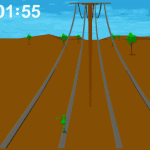one of this week’s reading, “six degrees” by Duncan J. Watts was an interesting read about the science behind networks themselves and the ever popular “six degrees of separation”. now, haven’t we all at times tried to work out how far our 6 degrees can take us? i know i do. we all want to be connected to someone famous, even if it’s just through the simple means of knowing someone who knows someone else. it’s a pretty cool idea, even if i do still find it kinda hard to believe that little ole’ me could be connected to those people who live in completely secluded tribes in random parts of africa who have never had contact with the outside world. i mean, come on, they’ve never met anyone outside their tribe?!?! how could i be connected to them. but according to Watts and another researcher named Milgram, i am. if only it was useful. but i guess if everyone is in the same boat, it doesn’t really make any difference to anyone.
onto networks! now, i would describe this reading as having three distinct sections. one useful one about networks, one at the end about the previously discussed six degrees of separation. and a random chunk in the middle about the author’s experiences in college, his professor’s experiences in college, repeated mentions of fire flies and experiments on crickets. poor little crickets, thinking some other cricket loved them but it was only just a machine. ok, i’ll try and stop getting distracted. the networks. the article revealed a lot about the sciences of networks, or, how there isn’t much so far regarding the sciences of networks, but there should be. i like this reading because finally it gave me something real to think about in regards to networks. i mean yeah, the past readings have too, but this was all “networks” in big flashing lights, telling me how we’re all connected.
i thought the story/metaphor about the blackout on the west coast of the USA was great (once i could get the image of bug on a wire out o my head, so much talk of electrical power wires). it just demonstrated how people underestimate the power a

connected network has. like in the human body, sometimes even if one tiny little element fails, it can bring down an entire system because the network relies on everything working together. the relation to the science of networks is concerned with working out how each individual element knows how to come together and work together so cohesively to produce an operating network. this again raises the idea that individually we are all part of one huge network that just somehow manages to function cohesively. i think it’s interesting that this is an emerging field of scientific research, presumably because the notion of networks has been taken for granted as simply existing up until now. i guess the current rise in technology, especially with the network of the internet, that people have begun to realise that networks are a huge factor in our lives and that understanding them could be extremely beneficial to the future of our society.
 although we are pretty emotional (although not as emotional as america.) but i guess that contributes to why we all feel very loved (yes, one of the maps showed that we feel the most loved compared to many other countries. here’s a virtual hug to everyone in the blue/sad countries on the love map)
although we are pretty emotional (although not as emotional as america.) but i guess that contributes to why we all feel very loved (yes, one of the maps showed that we feel the most loved compared to many other countries. here’s a virtual hug to everyone in the blue/sad countries on the love map)
 but i know its not. and then it just started talking about the Xanadu program and all i could think of was that huge Xanadu mansion from Citizen Kane because we were forced to watch that movie over 50 times in VCE for media. reading through the document and all the talk of introducing hypertext and saving files online, i was just thinking, “how old is this?”. then i passed the sentence saying that a new product called “CD’s” were coming out and i realised just how old it was, it’s really crazy just how much technology has changed in the last 30 years.
but i know its not. and then it just started talking about the Xanadu program and all i could think of was that huge Xanadu mansion from Citizen Kane because we were forced to watch that movie over 50 times in VCE for media. reading through the document and all the talk of introducing hypertext and saving files online, i was just thinking, “how old is this?”. then i passed the sentence saying that a new product called “CD’s” were coming out and i realised just how old it was, it’s really crazy just how much technology has changed in the last 30 years.